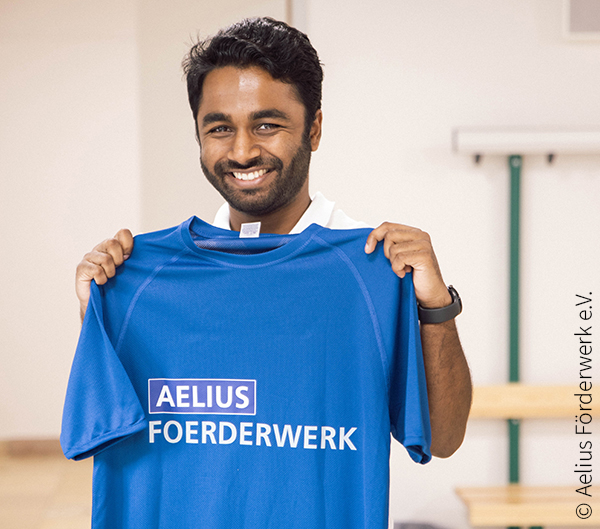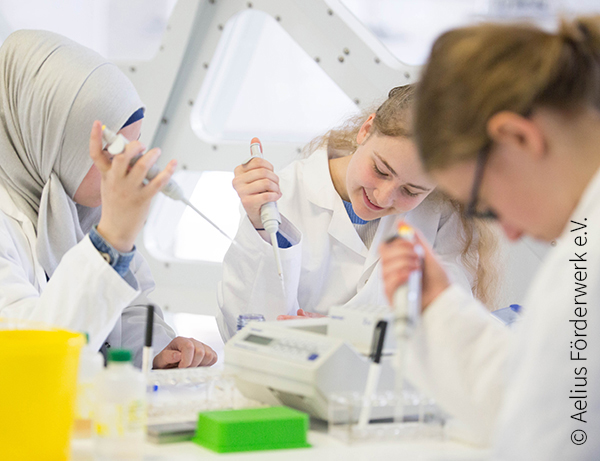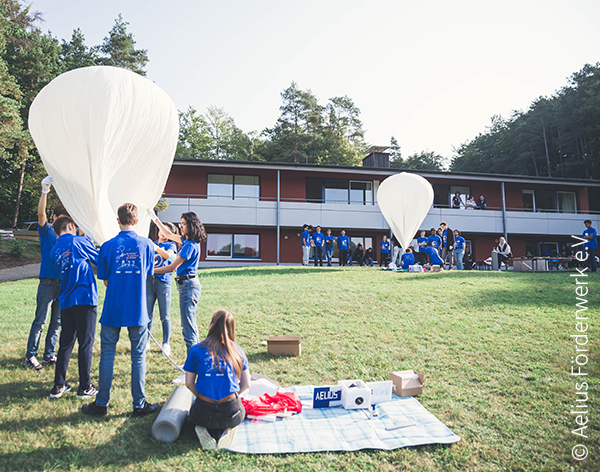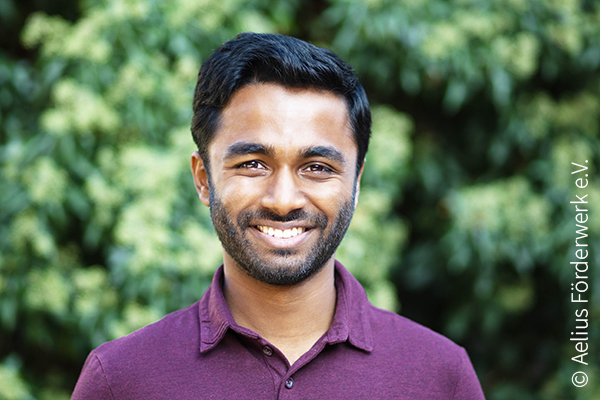
|
Help for children and young people living in povertyAn Interview with Sagithjan Surendra PROSTEP attaches great importance to diversity and integration, not just in its relations with its employees but also with regard to society as a whole. That is why, this year, we are supporting the Aelius Förderwerk e.V. youth mentoring organization as both a sponsor and donor. Aelius works to make sure that young people are able to receive the education they want and need, irrespective of their social and financial situation. 
Question: Mr. Surendra, what are the aims of the Aelius youth mentoring organization? Surendra: Our most fundamental aim is to make sure that children and young people can continue to follow their chosen path, irrespective of their social and financial circumstances. It makes no difference to us what this path is. For example, it could be a high school diploma, vocational training or a career in the arts. What is important for us is to give them the resources, support and encouragement they need to follow this path and help them realize how important their life experiences are in the wider social debate. We also want to encourage them to engage at the political level or serve as volunteers. Question: How did you come to choose the name Aelius Förderwerk and what does it mean? Surendra: When I was thinking about the form the mentoring organization might take, I felt I needed a working title and came across the name Aelius. It’s the name of an old plebeian family that succeeded in rising through the strata of ancient Roman society. Question: What motivated you to found the youth mentoring organization? Were you inspired by personal experience? Surendra: Yes. My parents are war refugees from Sri Lanka. I was born in Nuremberg, where I grew up poor, and was one of the few people in my family and my private life who had the opportunity to study. My studies were financed by a scholarship from the German Academic Scholarship Foundation, and it was then that I realized the wide range of sponsorship opportunities that are available. These are all fabulous programs, but I wish they would start earlier and make it possible for young people to enter higher education in the first place. That is how the idea of Aelius came about. Question: Did you have the feeling that you were disadvantaged in the German educational system? Surendra: I couldn’t say that on the basis of my own personal history, which has always been one of steady progress. But I have seen it much more among my friends and acquaintances. Even though we all started off under the same conditions, my career has been the absolute exception. We always talk about a permeable school system, but to me it feels more like a lottery. Germany is less equitable than other countries in terms of education. Ultimately, educational injustice is a symptom of social injustice and income distribution, and that is comparatively equitable in Germany. Question: Aelius has been recognized as a charitable organization. Was it difficult to obtain the status? Surendra: To tell the truth, it was something of an odyssey. I had no experience of founding anything and absolutely no legal expertise. The adviser I spoke to in the tax office told me straight away that he couldn’t recognize a scholarship program for school students as charitable because school education in Germany is free. Then, two years ago, a law firm helped us achieve the status we wanted. 
Question: What is the target group for the scholarship program? Surendra: We talk about disadvantaged children and young people and intentionally leave the definition very hazy. Most of the children we support are living in poverty. But there are also special cases, which we look at individually. We don’t examine evidence of income or other official documents, because that can easily discourage young people from applying. However, during the interviews we conduct to get to know them, we target our questions and are very quickly able to work out their socio-economic situation. Question: How does Aelius support socio-economically disadvantaged students? Surendra: Our most important support mechanism continues to be the mentoring program. We support children from the age of 14. We start with an interview to get to know them. During this, we look very closely at their wishes, the challenges they face and the issues they are currently dealing with. This interest-based matching process then leads on to the mentoring activity. For this, they are assigned a mentor who is appropriate for their particular circumstances and interests. Since the organization was founded, we have been able to help more than 8,000 school students via our various support mechanisms. Question: So you look for specific mentors who are right for the students who apply to you? Surendra: Yes, that is why the length of the matching phase may vary. In the best case scenario, we will find the right person in our database of volunteers. However, there are also plenty of cases where we actively have to go looking for someone in the locality. That can then sometimes take a month longer, but it’s worth it in the long run. The mentors work with the children for several years until they have finished school. The minimum is two years, but our average period of support is currently between three and four years. Question: How do you prepare the mentors to play this role? That’s quite a responsibility. Surendra: Definitely. It starts with child protection, that is to say an aptitude test, criminal record check and so on. Then there is a basic training course that all the mentors have to pass and in which all the fundamentals are explained. When mentoring then starts, the mentors are able to choose the topics that currently concern them or their mentees from a modular range of training activities. And then there are coaching services given by external coaches, who provide support independently of Aelius. Question: Is the financial support linked to the mentoring program? Surendra: Yes. If the children are accepted into the program, they are then entitled to take part in the workshops and benefit from the financial support that we are currently putting into place. We take on the education-related expenses, from school materials to language courses to Internet connections. In addition to all this, there is also the non-material support – a range of workshops, summer camps, etc. These are mostly three-day events that are visited by children from all over Germany, because it is important to us to help them meet other people with similar backgrounds. This peer-to-peer empowerment is very effective. We also offer them advice. We have a large network of volunteers who are available to meet short-term needs. These can be of help when applying for an internship or for government loans or grants. Although the mentoring officially ends when the children and young people leave school, they can continue to ask for advice after this. 
Question: What role do voluntary helpers play for Aelius? Surendra: It is the volunteers that make Aelius what it is. We were founded by volunteers who wanted the next generation to benefit from the same support that they themselves had received. That is why I said right at the start that one of our most important aims is to encourage the young people to engage with civil society. Now that we’ve been up and running for a few years, we have a large number of former mentees who work for us on a voluntary basis and are keeping this cycle going. That is the main reason why we have such a good relationship with our target group and find it very easy to reach out to young people living in poverty. Question: Aelius Förderwerk has two branch offices and seven permanent employees. How is the organization financed? Surendra: We are primarily funded by donations. These donations come from private individuals as well as from businesses or foundations that support us in specific projects or for a specific period. For example, the staff and program at our new office in Thuringia are financed by two foundations that like the fact that we are extending the opportunities we offer to Eastern Germany. Question: What awards have been conferred on you and/or the youth mentoring organization? Surendra: Actually, quite a few. We were awarded a nationwide award in the Start Social competition. The United Nations awarded us the Youth Peace Prize for Germany in 2020 and we have also been awarded the Bavarian Bürgerpreis (or Citizens’ Award). And I'll leave it at that. Question: This year, you opened your second office, in Erfurt. Why in Thuringia exactly? Surendra: As we have developed, we have noticed that although we are very active in metropolitan areas, we are reaching fewer school students in rural districts. And these are the very places where young people need more support because they are not part of a large network. We chose Thuringia because Eastern Germany, in particular, has a relatively high proportion of children growing up in poverty. And then there are also concerns about certain social and democratic developments, because we can see how marginalized social groups are played off against one another. Question: Are you considering opening more offices? Surendra: Yes. For us, Erfurt is something of a pilot project, a branch office that does not have to handle a vast program but is there to cater to just one German federal state. We will give ourselves a year to see how it works out and then take things from there. So far, everything is going very well. Question: Is the current debate on migration having any repercussions for your work? Surendra: Not directly, but it naturally has huge consequences for our target group. Most of the children we support have a migrant background. They grow up in poverty and know how poverty comes about. They find themselves caught in a difficult situation between the social debate about welfare benefits, hard work, etc., on the one hand, and the reality of their own lives, on the other. Mr. Surendra, thank you very much for this interesting interview. (This interview was conducted by Michael Wendenburg) 
About Mr. Surendra Sagithjan Surendra (born 1998) is the Chairman of Aelius Förderwerk e.V., which he founded during his studies together with a friend in 2017. He was born and grew up in Nuremberg as the son of war refugees from Sri Lanka. Mr. Surendra studied molecular medicine at Erlangen University, before then going on to complete a Master’s in Public Policy. He now has full-time responsibility for political communication for SOS-Kinderdorf e.V. He has received various awards for his voluntary activities – including “Student of the year” in 2020, “Top Talent under 25” and the German Academic Scholarship Foundation’s award for social engagement. |
|
| © PROSTEP AG | ALL RIGHTS RESERVED | IMPRINT | PRIVACY STATEMENT | YOU CAN UNSUBSCRIBE TO THE NEWSLETTER HERE. |
